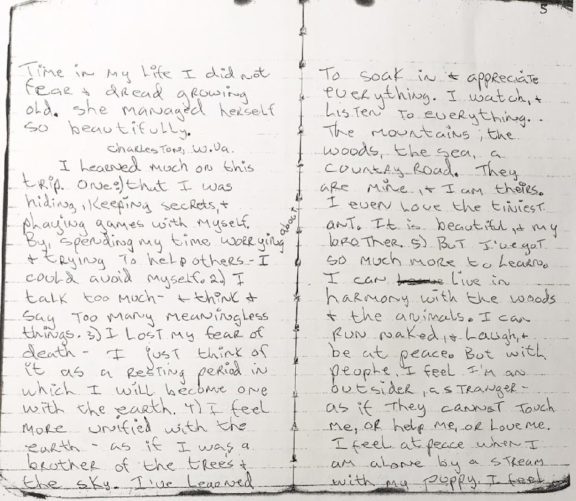Jodi Mae Mitchell, a self-described “teenage runaway” from West Virginia, filled out a journal regularly as she traveled on an unpredictable itinerary in the early-’70s — one that took her from her home in Charleston, W. Va., to Berkeley, back across the country, and then back to Berkeley and onto Wheeler’s Ranch, a commune in Northern California.
The first of Jodi’s three journals traces her inner journey as she looks for both a physical and a psychological feeling of “finding home.” Her urgency in leaving home and the intensity with which she ponders her state of mind offer insight into her reasons for leaving West Virginia and embarking on a quest for self-actualization.
In the beginning of her journal, Jodi thinks through her feelings of loneliness and the difficulty she feels in trying to relate to family, friends, or strangers. 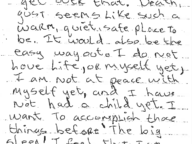 Jodi contemplates the possibility of suicide, as she feels so out of touch with herself and those around her. However, she makes a strong choice to search for meaning and inner peace on the road, serving as a guiding principle in her life of travel in and around Berkeley (page 12).
Jodi contemplates the possibility of suicide, as she feels so out of touch with herself and those around her. However, she makes a strong choice to search for meaning and inner peace on the road, serving as a guiding principle in her life of travel in and around Berkeley (page 12).
Much of the writing in Jodi’s journals comes from philosophers and thinkers as she explores life concepts and questions the ways of the world. Quotations from literary figures such as Walt Whitman and Henry David Thoreau are interwoven with accounts of her daily life. As her book proposal observes, Jodi felt drawn to the likes of Gandhi and Hermann Hesse for spiritual guidance—an interest she pursued in greater depth in the period covered in her second journal.
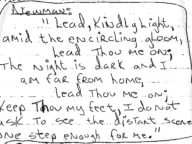 As she hitchhiked, Jodi carried with her this hymn by the 19th-century spiritual figure John Henry Newman: “Lead, kindly Light, amid the encircling gloom/ Lead thou me on; the night is dark and I am far from home/lead thou me on.” The words of the hymn served as an intellectual keepsake that fueled her travels and encouraged her to think critically about her experiences as she lived them.
As she hitchhiked, Jodi carried with her this hymn by the 19th-century spiritual figure John Henry Newman: “Lead, kindly Light, amid the encircling gloom/ Lead thou me on; the night is dark and I am far from home/lead thou me on.” The words of the hymn served as an intellectual keepsake that fueled her travels and encouraged her to think critically about her experiences as she lived them.
“All I want is a little room, my own quiet, warm little room [some]where — to sleep in, think in,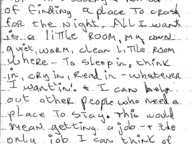 cry in, read in,” she wrote at one low point. She speculated that the one job she might get was as a “figure model” at UC Berkeley (perhaps working for studio art classes).
cry in, read in,” she wrote at one low point. She speculated that the one job she might get was as a “figure model” at UC Berkeley (perhaps working for studio art classes).
She hoped that a welfare office in Berkeley—once the people learned that she’d been evicted from her old place and had been “hitting speed and living on [the] streets”—might allow her to put her life back together by giving her the money to rent a small apartment. She offered a catalogue of reasons why it was hard for her to get a job: “no experience; no clothes, flunked out of h. school, still untogether ‘coz of drugs.”
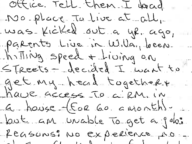
Jodi’s later recollections suggest that there was no quick solution — not from a Berkeley welfare office, not from the streets of Berkeley — to her difficulties.
